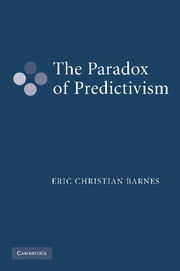Book contents
- Frontmatter
- Contents
- Acknowledgments
- Chapter 1 The paradox of predictivism
- Chapter 2 Epistemic pluralism
- Chapter 3 Predictivism and the Periodic Table of the Elements
- Chapter 4 Miracle arguments and the demise of strong predictivism
- Chapter 5 The predicting community
- Chapter 6 Back to epistemic pluralism
- Chapter 7 Postlude on old evidence
- Chapter 8 A paradox resolved
- Glossary
- Bibliography
- Index
Chapter 3 - Predictivism and the Periodic Table of the Elements
Published online by Cambridge University Press: 22 September 2009
- Frontmatter
- Contents
- Acknowledgments
- Chapter 1 The paradox of predictivism
- Chapter 2 Epistemic pluralism
- Chapter 3 Predictivism and the Periodic Table of the Elements
- Chapter 4 Miracle arguments and the demise of strong predictivism
- Chapter 5 The predicting community
- Chapter 6 Back to epistemic pluralism
- Chapter 7 Postlude on old evidence
- Chapter 8 A paradox resolved
- Glossary
- Bibliography
- Index
Summary
INTRODUCTION
Recall the happy predicament you imagined yourself to be in at the beginning of this book: you are, after years of subsisting on rice, beans, and basic cable TV, suddenly wealthy. You search for a financial advisor to help you invest your money, and choose an advisor with a strong record of predictive success over another who explains the same market fluctuations only ex post facto. This seems like an eminently wise choice, but why? Somehow or other, predictive success serves as an indicator that predictors know what they are talking about. It is time to get more precise about this claim.
In the previous chapter I sketched a pluralist model of theory evaluation and argued that pluralist theory evaluation is both widespread and important to the scientific community in a variety of ways. One reason for developing this model was to help undermine what Hardwig calls the romantic ideal of epistemic individualism, a myth I suspect still has some currency among philosophers of science. But the other reason for developing this model was to pave the way for a new account of tempered predictivism, one tailored to pluralist theory evaluators. The basic logic of this new account is suggested in the previous chapter: successful predictions, unlike accommodations, can serve two distinct purposes for the pluralist evaluator: they escape suspicion of adhocery and can provide a special kind of confirmation of the background beliefs of endorsers.
- Type
- Chapter
- Information
- The Paradox of Predictivism , pp. 60 - 122Publisher: Cambridge University PressPrint publication year: 2008

